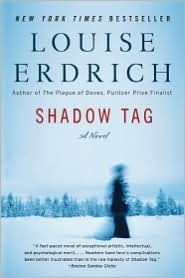
Shadow Tag A Novel
When Irene America discovers that her artist husband, Gil, has been reading her diary, she begins a secret Blue Notebook, stashed securely in a safe-deposit box. There she records the truth about her life and marriage, while turning her Red Diary—hidden where Gil will find it—into a manipulative charade. As Irene and Gil fight to keep up appearances for their three children, their home becomes a place of increasing violence and secrecy. And Irene drifts into alcoholism, moving ever closer to the ultimate destruction of a relationship filled with shadowy need and strange ironies. Alternating between Irene's twin journals and an unflinching third-person narrative, Louise Erdrich's Shadow Tag fearlessly explores the complex nature of love, the fluid boundaries of identity, and the anatomy of one family's struggle for survival and redemption.
Reviews
Daryl Houston@dllh
window@window
Trevor Berrett@mookse
Abby N. Lewis@abbynlewis